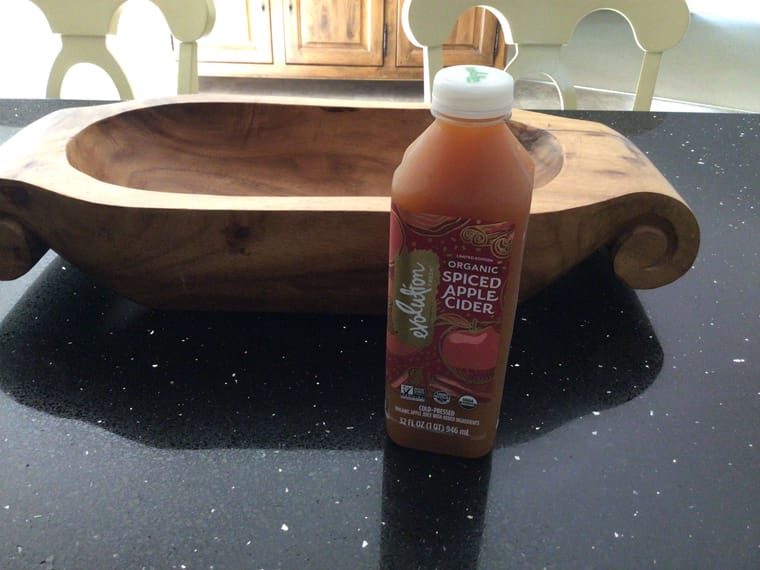The peatiest fruit suggestions
-
@lobotomize-me, gotcha. I’m wondering if it’s something inherent about apples that you’re intolerant to or if it has to do with the processing of the particular juice you bought. Along with the rotten apple/fungus issue that LetTheRedeemed mentioned, clarifying agents used in the processing of commercial juice that aren’t required to be listed on the label can be problematic, especially for those with compromised health.
I had a conversation about this topic with members on the old Ray Peat Forum so in case they’re useful, I’ll post my comments below, but I was having a severe reaction to commercial juice in 2023, which prompted me to switch to the cider as my staple juice. Within minutes of having commercially processed juice, my heart was racing, my breathing was labored, I was convulsing and breaking out in hives:

“I forgot to mention I also used to buy the Lakewood brand until I started having severe allergic reactions to what I thought was fruit. It turned out it was the clarifying agents used in the processing of bottled juices that aren’t required to be listed on the label, not even organic juice. I contacted the companies of the bottled juice I was drinking and all but Lakewood got back to me. The ones that did said they use clarifying agents. If you do an internet search for clarifying agents used in processing juice, you’ll get a ton of hits but to give you an idea of some that are used, you can see a list of them in the link below on pages 3–6:
Quality/Brix, i.e., the measurement of dissolved solids (sugar and minerals) is more important to me than whether or not juice is raw. There’s nothing in juice that I can’t get from the more nutrient dense animal products I consume so some nutrient loss from pasteurization isn’t a concern.”
And here’s my response to the question of pasteurized milk from the grocery store having clarifying agents:
“From my understanding, to meet consumer demands for low pulp and clear juice, clarifying agents are used to break down and separate plant matter that would otherwise make the juice fibrous and cloudy. Since what makes milk opaque has the most nutritive value—casein joins with calcium and phosphate to form micelles, and when light hits the micelle particles it causes the light to refract and scatter, making milk appear white—I can’t think of a reason why clarifying agents would be used, however, if milk is fortified with vitamins, the vitamin packs contain potentially problematic preservatives and emulsifiers like polysorbate 80 and propylene glycol. Same goes for cheese. Vegetable rennet used in cheese production is fermentation produced chymosin (FPC), which often contains trace amounts of sodium benzoate E211, and animal rennet can also have hidden additives like sodium acetate, propylene glycol and potassium sorbate. The cultures used often contain trace amounts of maltodextrin.”
My post isn’t meant to scare people off of what would normally be well-tolerated by the average person, it’s just something to consider if one’s health is compromised in any way. I no longer have allergic reactions to commercial juice or any other food.
-
@Jennifer wow commercial apple juice is worse than I thought!!!
Thank you thank you thank you I'm gonna try with my whole foods
-
My pleasure, @LetTheRedeemed.
 I’m keeping my fingers crossed that your Whole Foods has the cider.
I’m keeping my fingers crossed that your Whole Foods has the cider. -
-
pomegranate is peatiest fruit
-
I have peach, apricot and apple trees on my property. I also have a lot of grapes. So I eat a lot of those when they are sun ripened. I love to make sun jam from my apricots, it's delicious and I eat it with my home made sourdough bread.
This year I have a lot of watermelons too. So I am eating tons of that too. I don't keep it. Whatever I have too many of I give away.In winter I don't eat a lot of fruit when it's not in season. I do press store bought oranges for juice. Personally I would try to eat as much fruit in season as possible.
-
This post is deleted! -
@lobotomize-me y tho
-
@lobotomize-me said in The peatiest fruit suggestions:
@Jennifer, this kind of reasoning is not applicable to most foods. For example, apple juice tastes great but causes arsenic toxicity when consumed often.
It is applicable to most foods. the food that taste and make you feel the best, is the best food.
-
@user2 I only agree if they make you feel great long term.
But grasping that concept as humans, who only have direct comparison of the present to memories we have of the past, I must say it is hard to find something which can 100% make you feel good long term. And for that reason, one must research foods comprehensively.
A lot of foods make you feel good for a couple of hours and then make you crash after a while
-
@lobotomize-me said in The peatiest fruit suggestions:
@user2 I only agree if they make you feel great long term.
A lot of foods make you feel good for a couple of hours and then make you crash after a while
Then they aren’t good for you in your current state, and that’s not something you will discover from researching it. It must be experienced, for ourselves. I’ve learned the hard way that what looks good on paper can be disastrous in practice. The point of my original post is that just because a food’s nutritional profile looks ideal from a peaty standpoint doesn’t mean it’s the peatiest if we don’t actually enjoy it, and this is coming from Ray himself.
-
@Jennifer hey Jennifer. Would "unfiltered apple juice" be an indicator that no clarifying agents are used?
-
@LetTheRedeemed, not sure if you found some apple cider, but I was at Whole Foods yesterday and they carry a cold-pressed apple juice by the brand Evolution Fresh that is 100% apples, nothing else added, and I think it’s sold nationwide. They have a limited edition cider with cinnamon and nutmeg. It’s not as sweet as the Brookdale and Carlson ciders, but I added some honey to it and it was quite tasty heated up.

-
@Jennifer said in The peatiest fruit suggestions:
I added some honey to it and it was quite tasty heated up.
Fine but limit the amount or the frequency. Rather at the breakfast.
Apple is rich in fructose (processed by liver). Not to be transformed into fat in adipocytes. As well for honey. Not a problem if you balance with glucose and potassium. Potassium for metabolizing metabolites / to have them leave the body (+ water and pee easier ) (salicylates).
I'm sure you do it, but they are other readers ...
Personally, I target 50/50 glucose / fructose.
When I eat a pear, I often eat it at breakfast + another fruit. We are the land of peers, here in Belgium. Then I add a protein source (with fat) and a tsp coconut oil if I haven't got SFA enough.
Need a extra dose of glycine too to manage salicylates if you do that several times on the day. Or add a dose of potassium bicarbonate to avoid a drawback (target 7.5 pH). -
Hi @Aniciete, typically, yes. If it says unfiltered and the juice is cloudy with pulp, clarifying agents most likely weren’t used. It’s with clear juices, even those with some sediment at the bottom, that clarifying agents have likely been used.
-
Thank you for the tips, @LucH.

-
@LucH
Sorry for off topic, but Dutch or French speaking part of Belgium? -
@Luke said in The peatiest fruit suggestions:
Sorry for off topic, but Dutch or French speaking part of Belgium?
French speaking (Liège, 100 km from Brussel).

-
@LucH said in The peatiest fruit suggestions:
@Luke said in The peatiest fruit suggestions:
Sorry for off topic, but Dutch or French speaking part of Belgium?
French speaking (Liège, 100 km from Brussel).

Ah, I never really understood why that part is French speaking, as it's very close to the Netherlands, but I guess I don't know enough about the history and geography (as far as I know the border between Wallonie and Vlaanderen isn't far away). I was once in Maastricht and made a little trip the Liège, and when I started talking Dutch to waiter in a small café he looked at me as if I'm a lunatic.
To contribute something to the topic instead of just rambling: As long as it's ripe and you digest it well, all fruit should be pretty peaty.
-
@LucH said in The peatiest fruit suggestions:
@Luke said in The peatiest fruit suggestions:
Sorry for off topic, but Dutch or French speaking part of Belgium?
French speaking (Liège, 100 km from Brussel).

I only think of one thing, when I hear Belgium and French speaking. (As long as we're temporarily off topic.)


